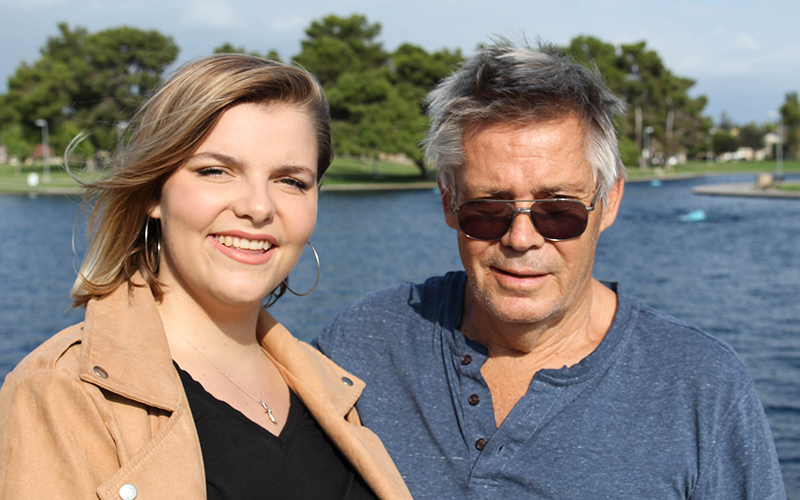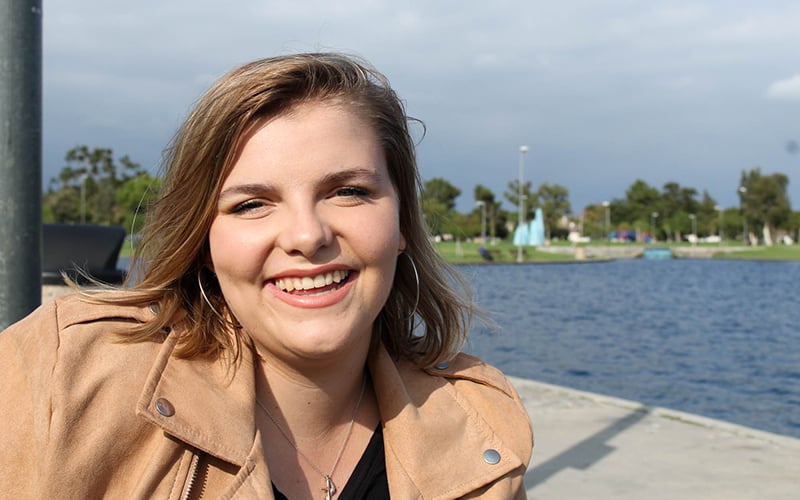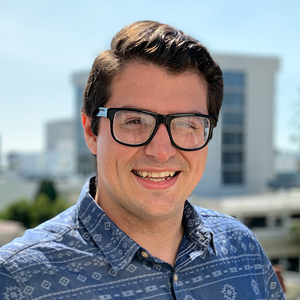
Emily Jenkins, 19, and her father Scott, 64, pose for a photo at Don Knabe Community Regional Park in Cerritos, a short drive from their home in La Palma. It’s a place the two of them used to ride bikes, before Scott’s condition declined. (Photo by Grayson Schmidt/Cronkite News)
CERRITOS, Calif. – On good days, Emily Jenkins’ dad walks into their La Palma home with fresh hibiscus blooms from the yard. His eyes fill with recognition. He smiles and tells her the bouquet is for her. Those moments can sustain Jenkins – through the day, sometimes for a week – as a caretaker for a man whose bad days now outnumber his good.
A recent Friday afternoon was not one of the good days.
As she sat on a park bench in Don Knabe Community Regional Park, her blond hair tucked behind an ear, Jenkins smiled tightly as she struggled to describe caring for someone with Alzheimer’s disease.
“My mom always tells me stories of like, ‘Oh, this is how he was,'” said said. “I, I can’t comprehend that because I didn’t see that.”
Dealing with her father’s early-onset Alzheimer’s means she, her older sister and her mother learned to expect the unexpected every day. Their visit to the park that Friday quickly shifted from a place where they once had strolled and ridden bikes to yet another place he didn’t want to be.
Jenkins told her father they wouldn’t be there long, but he grew irritated and tried to grab her car keys. She’s grown accustomed to their lurching interplay. She has to beat him when he makes sudden moves. She got to the keys first, but he grabbed her wrist and tried to pry them from her hands.
The ebbs and flows of providing care for someone with Alzheimer’s disease have been a part of her life since her father, Scott, 64, was diagnosed with the disease about 10 years ago.
Emily Jenkins just turned 19.

Emily Jenkins, 19, has grown up with a father who doesn’t always know who she is. Scott Jenkins was diagnosed with Alzheimer’s disease a little more than a decade ago; since then, Emily has been helping her mother and sister take care of him. (Photo by Grayson Schmidt/Cronkite News)
Alzheimer’s disease is an irreversible, progressive brain disorder that slowly destroys memory, thinking skills and the ability to carry out the simplest tasks, according to the National Institutes of Health. Of the estimated 5.8 million people with Alzheimer’s in the United States 2019, Scott Jenkins is one of 200,000 who were diagnosed while younger than 65.
His daughter’s situation is just as unique: Only 5% of Alzheimer’s caregivers are part of Generation Z, the nickname for those born after 1995. Millenials and baby boomers make up nearly two-thirds of the caregiver population for adults with Alzheimer’s, researchers have found, according to the research, data and insight company Kantar.
“I was going through my first relationship, my first heartbreak and my first dance and just life, and he was not there,” Emily said.
On a national level, Alzheimer’s is the sixth-leading cause of death, and where Emily lives, in Orange County, it is the third-leading cause.
The states with the highest Alzheimer’s mortality rates are primarily in the Southeast, however western states including California, Washington, Utah and Arizona all rank within the top half of the country, according to the Centers for Disease Control and Prevention.
In 2019, more than 140,000 Arizonans 65 or older are living with Alzheimer’s disease, according to the Alzheimer’s Impact Movement. The advocacy group says the state has the highest projected growth rate of the disease in the country, with a projected 43 percent growth among senior citizens by 2025.
As with many Alzheimer’s patients, Scott Jenkins can become disoriented, forgetful and even aggressive, and on this particular day the parent-child role-reversal is clear. Although she has spent basically half her life caring for her dad, Emily didn’t take offense to what happened at the park. She almost seemed unfazed.
“It’s just constantly figuring out what level he’s on that day,” she said. “Am I your daughter today? Or am I a mistress? Or am I just a caregiver? Am I your niece? Or whatever it is.”
Despite what her perceived role may be on a given day, Scott still is her father. She knows he doesn’t mean to be aggressive or lash out, and Emily wants the world to understand that – which is why the teenager started documenting her and her father’s journey on Instagram under the handle @letstalkalz.
“It’s about taking (that good moment) and amplifying it and knowing this is going to last me the whole week,” Emily said. “When he is getting in my face and yelling, and telling me how bad of a person I am, the real him is him bringing me flowers and bringing my mom flowers and telling my mom how much he loves her.”
It’s an approach that Kathy Carchidi, a family services specialist at Alzheimer’s Orange County, said she hopes leads to more conversation among youth.
“Just think about a teenager dealing with becoming a teen, the whole social aspect of that, the pressure of school, and then having a parent or grandparent that you look up to, that took care of you at one time, and now their roles are reversed,” Carchidi said.
Alzheimer’s Orange County provides support, referrals, education and resources for local families. The nonprofit offers roughly 70 support programs that cater to different age groups, religions and cultures, with programs in Spanish, Korean, Vietnamese, Japanese, Mandarin and Farsi.
“The biggest thing is we don’t want people to think they’re alone, and there are so many people that feel they’re alone in it,” Carchidi said.
The free programs are designed for unpaid caregivers, which in most cases is a relative. More than 16 million people in the country provide unpaid care for those with dementia, according to the Alzheimer’s Association. A major topic within these programs is the health of the caregivers.
“We’re always saying, you’ve got to take care of yourself,” Carchidi said. “Sometimes with introductions, I might go around a room in a support group and instead of saying, ‘Please introduce yourself and say who you’re taking care of,’ I might say, ‘Introduce yourself and let us know what the one thing is you did for self-care this week,’ which throws people off.”
After recounting the stresses of her day, Emily Jenkins appeared relieved to just switch subjects for a little while. As she sat on that park bench, she perked up as she started to describe an average day at her job as a babysitter. That might seem stressful for others, but for Jenkins it’s an escape.
“I can’t think of anyone else other than those kids and the people that I’m taking care of at that moment, so it’s a good release,” she said. “The kids are so free, so then it allows me to be free and release that energy.”
It’s also something she said her dad has never really asked about.
“I did try (to tell him about my day) in high school, but he’d always go off on a tangent about something else, so that was a bit of a heartbreaker,” Jenkins said.
Between the emotional and financial toll of caregiving, having an escape is huge for caregivers to maintain mental, emotional and physical health.
In addition to attending Fullerton College full time and works at a gym. As a child development major, Jenkins said her goal is to one day own her own day care. As she talked about her career choice and her hopes and dreams, as any 19-year-old would, for the first time that day she sounded like a regular teen.
Her mom, Theresa, made sure that despite the family’s unique situation, Emily and older sister Kaitlyn would still have some semblance of a traditional teenage experience.
“My mom was really good about making sure that I got to get out to senior activities, which I went to all of them, and all of my dances,” Jenkins said.
For the first few years after her father’s diagnosis, Jenkins didn’t fully understand what he was going through. Her mother and older sister did a good job of shielding her from what was happening, she said, and it wasn’t until her freshman year that she began to grasp the gravity of the situation. Amid the usual teenage activities, like hanging with friends, going to school dances, learning to drive and dating, at times she felt like she was missing a father figure.
“My dad never wanted to meet my friends, or never wanted to meet my boyfriends and would just like, brush it off,” she said. “But (he’s) supposed to be the one that scares them away or gives me the advice of like, ‘Oh, you’re going to be OK, honey.'”
Trying to describe that feeling to friends was almost impossible, she said. How is a teen supposed to describe the feeling of losing her father for more than 10 hours before finding him in a hotel parking lot? What’s the proper way to disclose that her father didn’t recognize his wife when she tried to kiss him goodnight?
“He stonewalled us and was like, ‘What do you think you’re doing? I’m married; you need to get out of here,'” she recalled.
Every 65 seconds, someone in the United States is diagnosed with Alzheimer’s disease, according to the Alzheimer’s Association. From 2000 to 2017, the number of deaths from Alzheimer’s disease as recorded on death certificates increased 145%, while the number of deaths from heart disease – the No. 1 cause of death – decreased 9%.
There is no cure, or way to delay or stop the progression of Alzheimer’s disease. New studies are being conducted at research centers across the country, one of which happens to be down the road from the Jenkins family, at the University of California-Irvine. This year, researchers at UCI announced they had discovered how to forestall Alzheimer’s in a lab setting, which could one day help in creating drugs that prevent the disease.
The research is headed by Dr. Kim Green, an associate professor of neurobiology and behavior. Green and his team of researchers found that by removing brain immune cells called microglia from rodent models of Alzheimer’s disease, plaques that are vital in the formation of Alzheimer’s disease never actually form. However, microglia are essential in regulating other brain functions, so removing all the immune cells is not an option.
“What our study sort of said is that (microglia) are very important for the formation of these plaques in the first place,” Green said. “Now that we know what it means we can work out precisely what they are doing and then we can develop new therapies that block that process, while leaving the microglia in place, so they can still protect us against pathogens and other things.”
Green said that the next step is to work out what the microglia are doing to allow these plaques to form in the first place, and from there they would develop new drugs that don’t get rid of the microglia, but block them from doing that particular function. However, testing this in humans is another matter entirely.
“What we’re doing at the moment is not necessarily something that we would do in people in any way, shape or form,” Green said.
Even if it were, the research being done would not reverse the effects of Alzheimer’s, which makes the process of obtaining candidates difficult because researchers need patients who have not yet fully developed the symptoms.
With the sun shining over the lake in Don Knabe Park, the lake she and her dad would ride bikes around when she was a girl, Jenkins agreed to a photo. She asked her dad if he would be in it too, but the request seemed to confuse him, so he declined and offered to take one just of her.
After a deep breath, Emily said she wanted one of the two of them together, and his confusion seemed to fade.
“Would it make you happy?” he asked.
Emily looked up at him and smiled, “Yes it would.”
Patience is something she has learned on top of everything else a teenager has to, often on her own. The next teen who is thrown into a similar situation will have Jenkins’ story to learn from, or at least that is her hope.
“I’m very proud of her and her compassion,” Theresa Jenkins said of her daughter. “It’s definitely a need and hopefully it takes off more because you don’t know who’s experiencing it.”
After raising two teenagers, she knows the difficulties of getting them to open up, especially if they feel as if no one else will understand. That’s the whole reason Jenkins set up her Instagram account, and why she helps facilitate youth programs with Alzheimer’s Orange County.
When her dad was first diagnosed, Emily vividly remembers the impact a few simple words had. Although it was from someone more than twice her age, all it took was an email from a fellow caregiver, letting a young girl know she had someone in her corner.
“There’s someone out there that’s willing to help you, if you ask,” Emily said. “I hope whoever is struggling or feels alone finds someone, whether it’s me, a family member, a friend or just someone to talk to you that understands.”
The teen is the first to admit that she doesn’t have time to keep tabs on the latest Alzheimer’s research, and she expects her father’s condition to continue declining before science can change things. Emily believes sharing her story and letting other teens in similar situations know they aren’t alone is a change worth making.
“I want to be a part of that breakthrough.”

